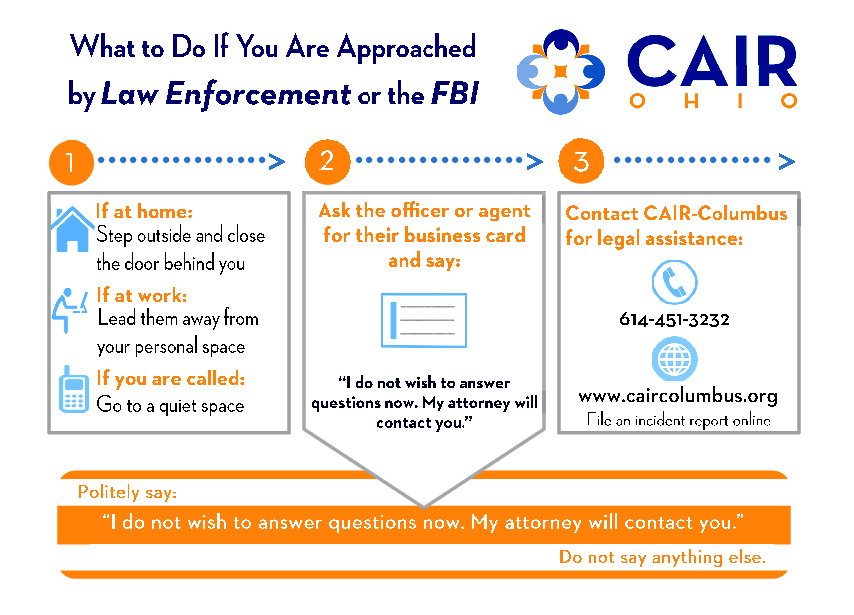
June 26th, 2017 | cairclev
WHAT IF THE FBI COMES TO MY DOOR?
Your right to be politically active and to hold different beliefs/views is protected by the Constitution. If you are visited by the FBI, remember:
1) You do not have to talk to the FBI. You have no obligation to talk to the FBI, even if you are not a citizen. Never meet with them or answer any questions without an attorney present. Refusing to answer questions cannot be held against you. It does not imply that you have something to hide, even though they may tell you otherwise.
2) You do not have to permit them to enter your home or office. FBI agents must possess a search warrant in order to enter your house. If they say they have a warrant, demand to see it before allowing them to enter. Even if they have a warrant, you are under no obligation to answer questions.
3) Never lie or provide false information to the FBI. It is better to refuse to answer any questions. Lying to an FBI agent is a crime.
If you are contacted by the FBI, take their business card and politely tell them you will have your attorney contact them. Then contact CAIR-Ohio for advice. We can provide you with free legal representation.
WHY SHOULDN’T I TALK TO THE FBI WITHOUT A LAWYER?
Here’s a common situation we hear about quite often:
“The FBI showed up at my house at 6:30 in the morning with a search warrant. They put my wife in the kitchen, and they put me in the living room, and we each talked to the FBI. We gave interviews for six hours.”
The reason the government executes a search warrant at 6:30 in the morning is they know it’s disorienting and they have a script of questions prepared by a prosecutor who’s not there. They do it to try and keep the person who’s being investigated off balance. (Therefore) the main thing is just to be quiet. The less you talk, the better. People seem to think that: If I haven’t done anything wrong, then it’s okay for me to talk to the government. And that’s just dead wrong. If you inadvertently say something not true, it can be charged with a crime.
People seem to think that everything is taped, so that their words can’t be misinterpreted. The FBI’s policy is not to tape anything. When they show up, they have two agents there and they interview you.
They take notes and they write [those notes] into a report called a “302.” It’s their recollection … because there’s no tape. They do that because that way they keep control of what the answers are, what the questions are. So they can put anything they want in there. So you may say something at 6:30 in the morning that could be interpreted one of two ways, but chances are it’s going to get interpreted the way that makes you look guilty. So it’s much better if you just don’t say a word.
The other thing is that there are plenty of people who, once they’re caught in this trap, they end up getting convicted of a [less] substantive offense. [For example], they’re being investigated for fraud [but] they don’t get convicted of fraud or even charged with fraud. They get charged with lying to a federal agent. If it is determined that you lied to a federal agent, it’s determined by the FBI that you lied to them, you can be charged. That’s a crime. So you end up getting prosecuted for something that you [weren’t] being investigated for.
So, at the end of the day, it’s better to just be quiet and consult with attorney. There is no risk to exercising your right to have a lawyer present but there are a lot of risks when you talk to the FBI without one.